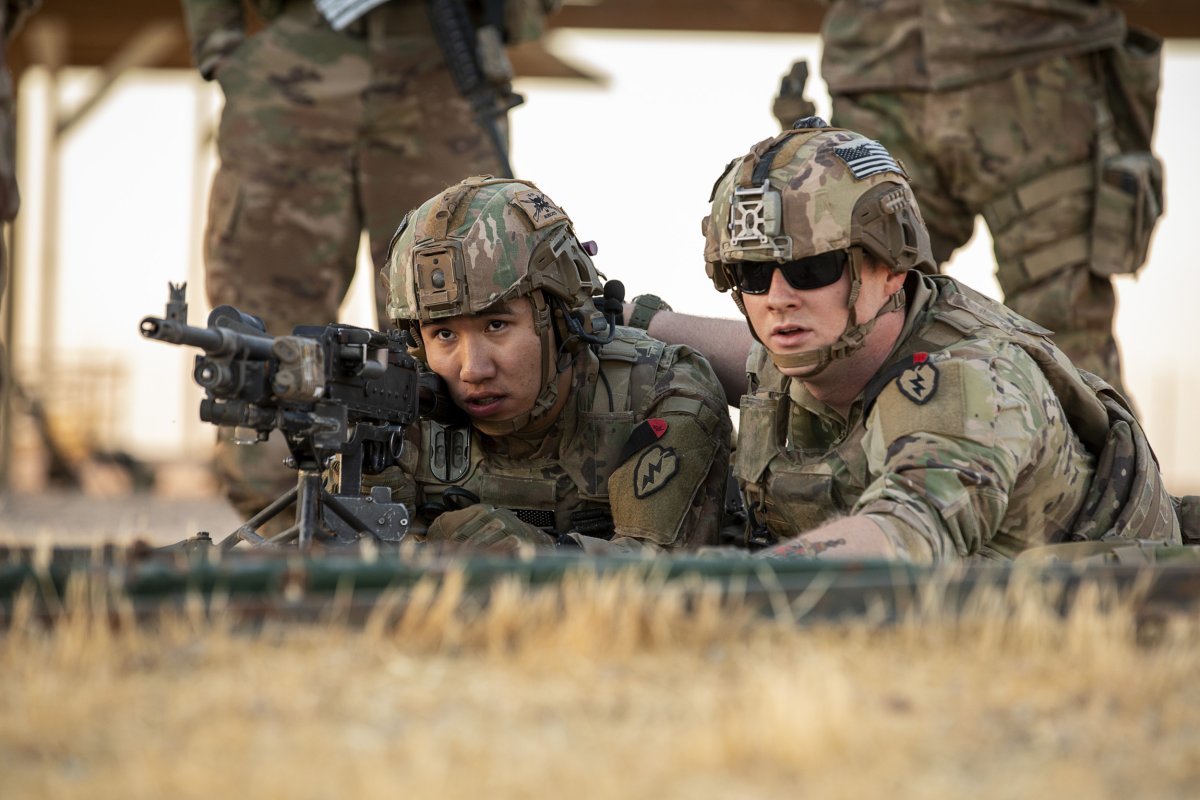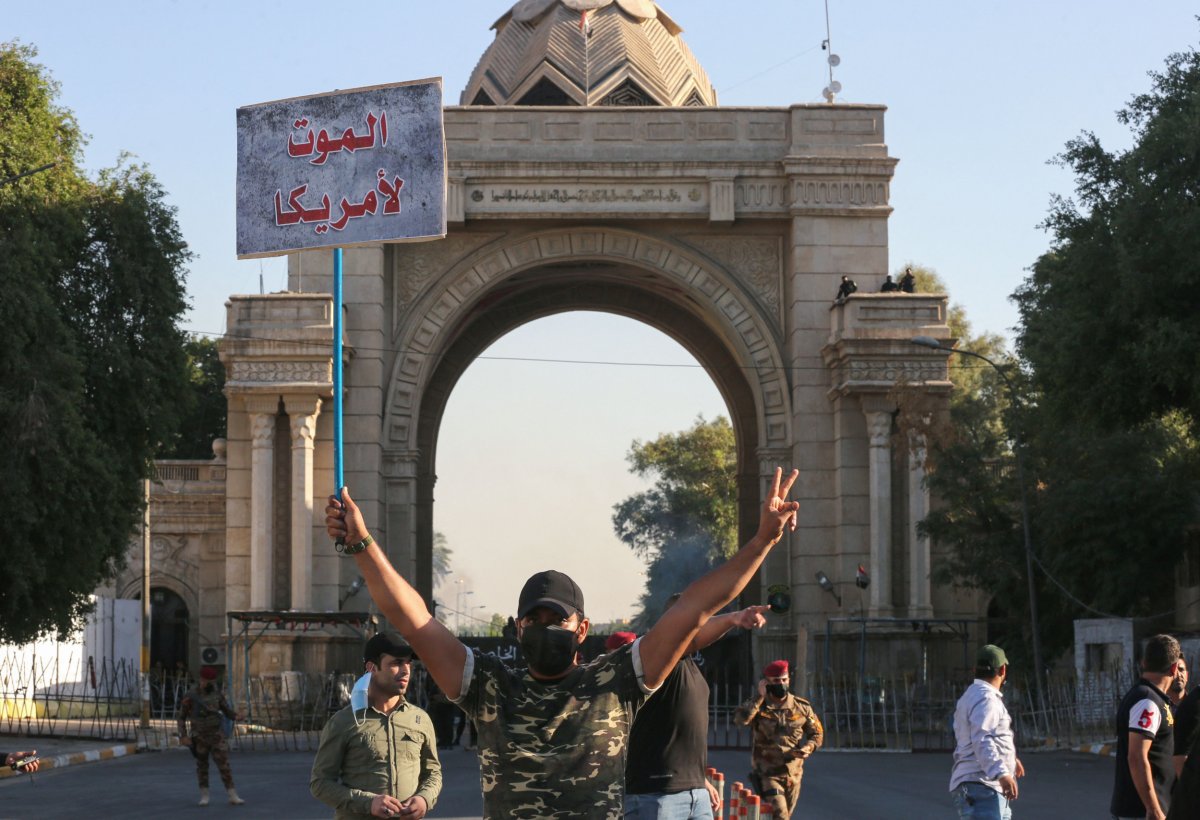Defying a warning from local militias, a Pentagon official has told Newsweek that U.S. forces will remain in Iraq after the scheduled end of combat operations on December 31.
With less than a month and a half left in the year, an ensemble of Iraqi paramilitary factions known as the Iraqi Resistance Coordination Commission shared with Newsweek a message Friday expressing disappointment with the lack of U.S. military drawdown.
Following talks with Iraqi Prime Minister Mustafa al-Kadhimi in July, President Joe Biden had promised an end to the U.S. combat mission in the country by year's-end.
The message expressed skepticism in the original commitment, noting that roughly four months later, the commission had "not yet seen any manifestations of withdrawal, despite that only 42 days separate us from 12/31/2021."
The statement also alluded to observations "that the brazen American occupation increased its numbers and equipment in its bases in Iraq," as well as referencing reports suggesting the U.S. intended "not to withdraw from the country under the pretext that there was a request from Baghdad [not] to do so," something the commission said the Iraqi government has yet to deny.
"We affirm that the weapons of the honorable resistance, which have been talked about a lot in the past days, and some insisted on embroiling them in recent political rivalries, will be ready to dismember the occupation as soon as the moment comes and the deadline ends after twelve o'clock in the evening of 12/31/2021," the statement said.
This message has been reinforced by leading militia groups such as Kataib Sayyid al-Shuhada and the Hezbollah al-Nujaba Movement.
In response, Pentagon spokesperson Navy Commander Jessica McNulty said the U.S. position remains unchanged, and that no total exit is in order.
"The United States will uphold the commitments it made during the July 2021 U.S.-Iraq Strategic Dialogue, including that there will be no U.S. forces with a combat role by the end of the year," McNulty told Newsweek. "U.S. forces will remain in Iraq, at the invitation of the Government of Iraq, in an advising, assisting, and intelligence-sharing role to support the Iraqi Security Forces in the campaign to defeat ISIS."

Defense Secretary Lloyd Austin expressed a similar sentiment over the weekend during a meeting in the Bahraini capital of Manama with his Iraqi Defense Minister Jumah Inad Sadun al-Jaburi, whom the Pentagon chief assured that "there will be no U.S. forces with a combat role by the end of the year," according to the Defense Department.
"The two leaders discussed the next phase for the U.S. military mission in Iraq, which will focus on advising, assisting, and sharing intelligence with the Iraqi Security Forces in support of the campaign to defeat ISIS," the readout stated on Saturday.
But the Biden administration has offered little insight into exactly what this next phase will look like.
In a statement carried by the Iraqi National News Agency that same day, Iraqi Major General Tahsin Al-Khafaji, spokesperson for the Joint Operations Command, said Washington and Baghdad were sticking to their deal.
He said that "talking about extending the date for the withdrawal of American forces is inaccurate and incorrect, and the date for the departure of combat forces on the 31st of next December is fixed and there is no change in it."
"The relationship between the two parties after the departure of the combat forces will be an advisory relationship in the fields of training, armament, intelligence and security information against the terrorist organization ISIS," he added.
Iraq declared victory over the Islamic State militant group (ISIS) in December 2017, and has credited both the U.S. and Iran with supporting operations that ultimately decimated the self-styled caliphate erected by the jihadis across large swathes of Iraq.
But tensions that have since emerged between Washington and Tehran have torn Baghdad from within, especially in the form of clashes between U.S. troops and Iraqi militias, some of whom have received direct support from Iran.
A U.S.-Iran feud that erupted in 2018 when former President Donald Trump's withdrew from a nuclear deal reached three years earlier during the Obama administration escalated into a regional bout consuming Iraq and the nearby Persian Gulf. Tensions ratcheted up dramatically in January 2020 after a cycle of tit-for-tat actions culminated in the U.S. slaying that month of Iranian Revolutionary Guard Quds Force commander Major General Qassem Soleimani and Iraqi Popular Mobilization Forces deputy chief Abu Mahdi al-Muhandis at Baghdad International Airport.
Iran responded with a missile barrage against U.S. positions at the Ain Al Assad Air Base, and Soleimani's successor, Esmail Qaani, and an array of friendly militias forming the Axis of Resistance swore further revenge. Iraqi lawmakers also voted to expel U.S. forces.
And while U.S. troop numbers were drawn down over the course of 2020, no timeline for withdrawal has been announced either by Trump or Biden. Militia attacks have continued this year, and Biden has twice ordered airstrikes against the powerful Kataib Hezbollah and Kataib Sayyid al-Shuhada groups operating in Iraq and Syria in response to rocket strikes against U.S. positions.
Amid a precarious national security situation, Iraq held elections last month, resulting in a boost for influential cleric Muqtada al-Sadr, and lower-than-expected outcomes for militia supporters, who took to the streets to protest the results. At least two demonstrators were killed and others injured during the demonstrations that ensued.
Further stressing Iraq's strained stability, bomb-strapped drones attacked Kadhimi's residence earlier this month in an unclaimed assassination attempt condemned by all sides, including the U.S., Iran and Iraqi militias. Rallies continue against Kadhimi and over the U.S. military presence in Iraq.
As to hopes for de-escalation between Washington and Tehran, the two sides are set to resume indirect negotiations next week in the Austrian capital of Vienna for the seventh round of talks since Joe Biden took office, joining other signatories of the nuclear deal in an effort to secure a U.S. return and full Iranian compliance with the accord.

Uncommon Knowledge
Newsweek is committed to challenging conventional wisdom and finding connections in the search for common ground.
Newsweek is committed to challenging conventional wisdom and finding connections in the search for common ground.
About the writer
Based in his hometown of Staten Island, New York City, Tom O'Connor is an award-winning Senior Writer of Foreign Policy ... Read more
To read how Newsweek uses AI as a newsroom tool, Click here.








